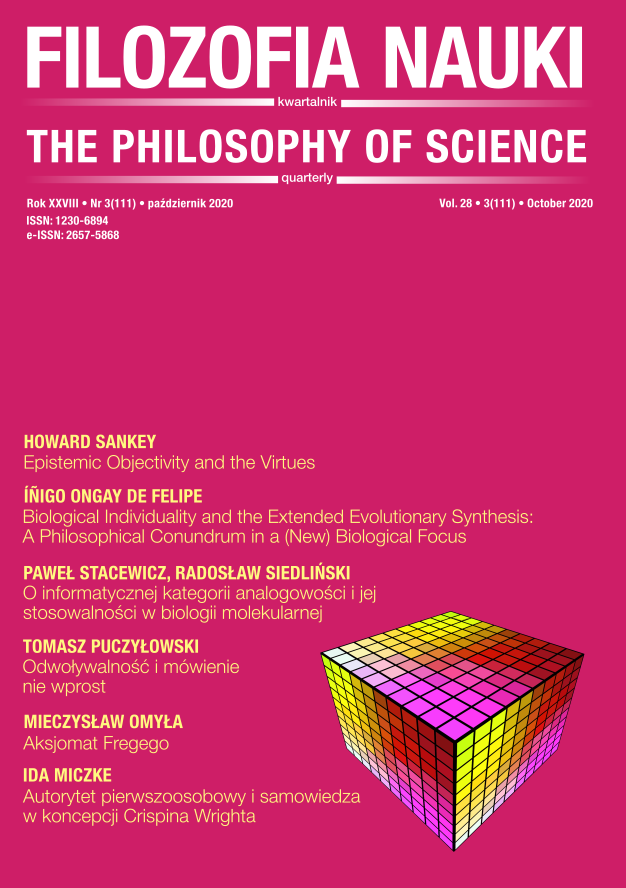Odwoływalność i mówienie nie wprost
DOI:
https://doi.org/10.14394/filnau.2020.0016Słowa kluczowe:
conversational implicature, cancellability, saying something indirectly, sayingAbstrakt
The aim of this article is to defend the thesis that every conversational implication is cancellable. To this end, I propose a precising definition of cancellability and, based on an analysis of examples proposed by Bach (2006) and Carston (2002), introduce the category of indirectly saying that p. I stipulate that person X said indirectly that p iff (i) X did not say (directly) that p, (ii) from what X said and the analytical truths of the language, it follows that p, and (iii) X meant that p. I define
cancellability as follows: if the use of sentence S in context C implies proposition P then P is a cancellable part of this act iff there is a sentence S* and a context C* such that (i) S is a proper part of S*, (ii) S follows from S*, and (iii) P is not implied by S* in C*, but assertion of S* is admissible in C*.
Bibliografia
Adams F., Fuller G. (2007), Empty Names and Pragmatic Implicatures, „Canadian Journal of Philosophy” 37, 449-462. https://doi.org/10.1353/cjp.2007.0024
Åkerman J. (2015), Infelicitous Cancellation: The Explicit Cancellability Test for Conversational Implicature Revisited, „Australasian Journal of Philosophy” 93(3), 465-474. https://doi.org/10.1080/00048402.2014.988738
Bach K. (2006), The Top 10 Misconceptions about Implicature [w:] Drawing the Boundaries of Meaning: Neo-Gricean Studies in Pragmatics and Semantics in Honor of Laurence R. Horn, B. Birner, G. Ward (eds.), Amsterdam: Benjamins, 21-30. https://doi.org/10.1075/slcs.80.03bac
Bach K., Harnish M. (1979), Linguistic Communication and Speech Acts, Cambridge, MA: MIT Press. https://doi.org/10.1016/0024-3841(79)90047-0
Blome-Tillmann M. (2008), Conversational Implicature and the Cancellability Test, „Analysis” 2(68), 156-160. https://doi.org/10.1093/analys/68.2.156
Blome-Tillmann M. (2013), Conversational Implicatures (and How to Spot Them), „Philosophy Compass” 2(8), 170-185. https://doi.org/10.1111/phc3.12003
Bogusławski A. (2007), A Study in the Linguistics-Philosophy Interface, Warszawa: BEL Studio.
Borge S. (2009), Conversational Implicatures and Cancellability, „Acta Analytica” 24(2), 149-154. https://doi.org/10.1007/s12136-009-0049-1
Burton-Roberts N. (2006), Cancellation and Intention, „Newcastle Working Papers in Linguistics” 12-13, 1-12.
Cappelen H., Lepore E. (2005), Insensitive Semantics: A Defense of Semantic Minimalism and Speech Act Pluralism, Oxford: Blackwell. https://doi.org/10.1002/9780470755792
Carston R. (2002), Thoughts and Utterances: The Pragmatics of Explicit Communication, Oxford: Blackwell. https://doi.org/10.1002/9780470754603
Colonna Dahlman R. (2013), Conversational Implicatures Are Still Cancellable, „Acta Analytica” 28, 321-327. https://doi.org/10.1007/s12136-012-0177-x
Danielewiczowa M. (2002), Wiedza i niewiedza. Studium polskich czasowników epistemicznych, Warszawa: Uniwersytet Warszawski, Katedra Lingwistyki Formalnej.
Geurts B. (2010), Quantity Implicatures, Cambridge: Cambridge University Press. https://doi.org/10.1017/CBO9780511975158
Greń Z. (1994), Semantyka i składnia czasowników nazywających akty mowy w języku polskim i czeskim, Warszawa: Slawistyczny Ośrodek Wydawniczy.
Grice P. (1980), Logika a konwersacja, tłum. B. Stanosz [w:] Język w świetle nauki, B. Stanosz (red.), Warszawa: Czytelnik, 91-114.
Grice P. (1989a), Further Notes [w:] Studies in the Ways of Words, Cambridge, MA: Harvard University Press, 41-57.
Grice P. (1989b), Utterer’s Meaning and Intention [w:] Studies in the Ways of Words, Cambridge, MA: Harvard University Press, 86-116.
Grice P. (1989c), Utterer’s Meaning, Sentence-Meaning, and Word-Meaning [w:] Studies in the Ways of Words, Cambridge, MA: Harvard University Press, 117-137.
Grzesiak T. (2018), Dobro osobiste jako dobro zindywidualizowane, „Przegląd Sądowy” 4, 7-41.
Huitink J., Spenader J. (2004), Cancelation Resistant PCIs [w:] Proceedings of the ESSLLI 2004 Workshop on Implicature and Conversational Meaning, B. Geurts, R. van der Sandt (eds.), Nancy: University of Nijmegen, 8-13.
Jaszczolt K. (2009), Cancellability and the Primary/Secondary Meaning Distinction, „Intercultural Pragmatics” 6(3), 259-289. https://doi.org/10.1515/IPRG.2009.015
Levinson S. C. (2000), Presumptive Meaning: The Theory of Generalized Conversational Implicature, Cambridge, MA: The MIT Press. https://doi.org/10.7551/mitpress/5526.001.0001
Levinson S. C. (2010), Pragmatyka, tłum. T. Ciecierski, K. Stachowicz, Warszawa: Wydawnictwo Naukowe PWN.
Marciszewski W. (1972), Podstawy logicznej teorii przekonań, Warszawa: Państwowe Wydawnictwo Naukowe.
Neale S. (1992), Paul Grice and the Philosophy of Language, „Linguistics and Philosophy” 15(5), 509-559. https://doi.org/10.1007/BF00630629
Odrowąż-Sypniewska J. (2010), Sprawozdania w mowie zależnej, „Przegląd Filozoficzny — Nowa Seria” 19(3) [75], 263-276.
Odrowąż-Sypniewska J. (2012), What is Said and Indirect Speech Reports, „Research in Language” 10(3), 345-352. https://doi.org/10.2478/v10015-011-0026-9
Palczewski R. (2016), O odwoływalności implikacji pragmatycznych, „Przegląd Filozoficzny — Nowa Seria” 25(2) [98], 271-285.
Puczyłowski T. A. (2014), Argument z implikatury konwersacyjnej w polemikach filozoficznych, Warszawa: Wydział Filozofii i Socjologii Uniwersytetu Warszawskiego.
Puczyłowski T. (2019), Fictional Sentences and the Pragmatic Defence of Direct Reference Theories, „Studia Semiotyczne” 33(2), 259-276.
Puczyłowski T., Ziembicki D. (2018), O implikaturach konwersacyjnych pytań, „Filozofia Nauki” 26(1) [101], 23-48. https://doi.org/10.14394/filnau.2018.0002
Sperber D., Wilson D. (1986), Relevance: Communication and Cognition, Oxford: Basil Blackwell.
Tryka B. (2017), Zagadnienie uczuć religijnych w kontekście artykułu 196 kodeksu karnego, „Analiza i Egzystencja” 40, 67-93. https://doi.org/10.18276/aie.2017.40-04
Walczak G. (2016), On Explicatures, Cancellability and Cancellation, „SpringerPlus” 5(1). https://doi.org/10.1186/s40064-016-2789-x
Weiner M. (2006), Are All Conversational Implicatures Cancellable?, „Analysis” 2(66), 127-130. https://doi.org/10.1093/analys/66.2.127
Wharton T. (2002), Paul Grice, Saying and Meaning, „University College London Working Papers in Linguistics” 14, 207-248.
Wiśniewski A. (1995), O logice stwierdzania [w:] J. Paśniczek i in. (red.), Między logiką a etyką. Prace ofiarowane Profesorowi Leonowi Kojowi, Lublin: Wydawnictwo Uniwersytetu Marii Curie-Skłodowskiej, 53-63.
Wójcicka A. (2016), Mówienie i dawanie do zrozumienia. Studium semantyczne czasowników komunikacji niebezpośredniej, Warszawa: Uniwersytet Warszawski, Katedra Lingwistyki Formalnej.
Zakkou J. (2018), The Cancellability Test for Conversational Implicatures, „Philosophy Compass” 13, e12552. https://doi.org/ 10.1111/phc3.12552



















 Filozofia Nauki | ISSN 1230-6894 | e-ISSN 2657-5868
Filozofia Nauki | ISSN 1230-6894 | e-ISSN 2657-5868